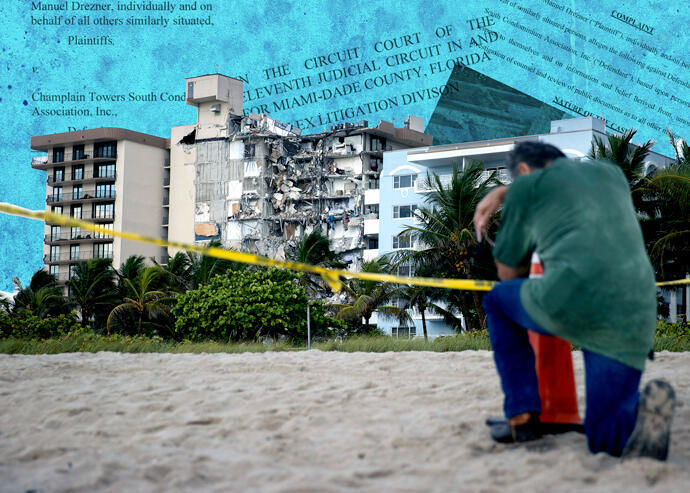
The suit cites public comments made by association attorney Ken Direktor that structural “repair needs had been identified,” but were not done (Getty)
The first known lawsuit has been filed in the aftermath of the Surfside condominium building collapse that left 159 missing and at least four dead.
Unit owner and resident Manuel Drezner sued the Champlain Tower South Condominium Association, seeking class action status and more than $5 million in damages.
Drezner, who owns unit 1009, alleges that the association could have prevented the calamity, but it did not properly oversee the tower, and it did not tell residents and visitors that adequate safety was not in place.
Drezner lived in the building but was out at the time of the collapse. His unit was destroyed, and he’s now staying with family.
The suit cites public comments made by association attorney Ken Direktor that structural “repair needs had been identified,” but were not done, according to the complaint, filed late Thursday in Miami-Dade Circuit Court.
The ocean-facing part of the 12-story Champlain Tower South, at 8777 Collins Avenue, collapsed at roughly 1:30 a.m. Thursday, leaving families and loved ones of the missing reeling more than a day later, still hoping rescue crews will find survivors. Rescue crews from across agencies have descended on Surfside to search for people trapped in the rubble.
Note: This video was published on Thursday, 6/25. Numbers are changing daily
The 135-unit tower was developed in 1981 by the late Nathan Reiber and was undergoing its 40-year recertification, the minimum that Miami-Dade County requires.
Direktor told The New York Times that an engineer retained for the recertification inspection had spotted rusted steel and damaged concrete and the issues were in line to be repaired, but he added that nothing indicated the problems caused the collapse.
Attorney Brad Sohn, who represents Drezner, said it is likely the lawsuit would be amended to add other defendants and claims. So far, it levies negligence, breach of implied warranty of habitability and breach of contract counts as well as a res ipsa loquitur, which allows the court to infer negligence.
Donna DiMaggio Berger, another attorney for the association, said the board had sent out requests for concrete contractors to bid for the work but the proposals had not come back yet.
Typically, in older, oceanfront buildings, there is concrete spalling on the balconies, but this would not cause a collapse, Berger added. She and Direktor are lawyers with Becker.
Berger called the lawsuit “despicable” and disrespectful to the people still searching for family and friends. The condo association board’s president, Jean Wodnicki, and her husband are among the survivors, having run out of the building with only “the clothes on their back,” but the association’s vice president, Nancy Levin, still is missing, Berger said.
“There is still a search and rescue mission going on to find almost 100 people unaccounted for, and this plaintiff and this law firm found it necessary at this point in time to focus on this?” Berger said. “Nobody else has figured out what brought this building down but Mr. Sohn has apparently?”
Sohn said he and Drezner stand by the allegations in the complaint.
“Lawyers don’t dream of lawsuits. Clients retain lawyers when they are victims of wrongdoing,” Sohn said.
An official cause of the collapse has not been determined, although experts have speculated that it could have been a storm of factors such as deterioration over time exacerbated by the proximity to salt water, issues with construction from the get-go, and other factors.
Sohn reiterated in a news release that this was preventable, and said that as an attorney, he “can’t fix what’s happened.”
“But what I can do is fight to immediately fully compensate these victims so that they can focus all of their energy on healing as best they can,” he said in a statement. “A lawsuit is necessary to force all parties to preserve documents and records regarding this building and ensure a thorough investigation into this tragedy.”



